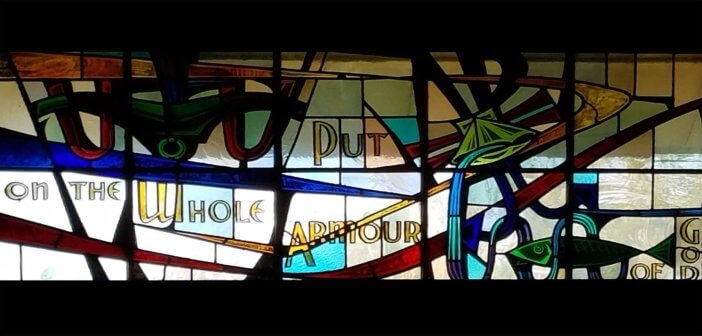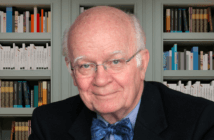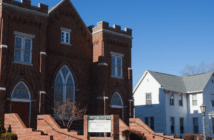David McAllister-Wilson, president of Wesley Theological Seminary, sees courage as essential to church leadership. He explains how courage is formed not through study or proclamation, but within groups where people care about one another and are committed to a common mission.
Courage is an essential virtue necessary for faithful leadership. Think of the courage it takes to walk into the room of someone who is dying, to evangelize the unchurched, or just to stand up every Sunday morning to speak. But what about the courage it takes to preach the unpopular word? Or the courage to intervene with the alcoholic father of one of the kids in the youth group? Or what about the courage it takes a congregation to speak in the public square about issues like racism and economic injustice, immigration, prison reform, or the health care system?
The bonds that form in human community are key to the formation of courage among those who covenant with each other as they pursue a common mission.
It takes courage to change. It takes courage to risk. And so courage is essential for leadership. As C. S. Lewis said, “Courage isn’t simply one of the virtues, but the form of every virtue at the testing point.”
It might seem that courage simply comes with wisdom. If we read and discuss Martin Luther King Jr.’s Letter from a Birmingham Jail or Dietrich Bonhoeffer’s The Cost of Discipleship, we will absorb the lesson. But while wisdom is knowing the difference between the way things are now and the way things will be in the Kingdom of God, courage is the ability to move from one to the other.
Courage and empathy
In What Makes a Hero? The Surprising Science of Selflessness, Elizabeth Svoboda surveys what we know. She finds “heroism and altruism are hues in a single broad spectrum of generosity,” meaning the issue is how we become more generous of our time, our talent, our treasure, and our lives. It’s probably not surprising that heroes are made, not born, and that role models are important. Her most important finding is that courage is developed in groups who develop empathy for each other.
I have learned a lot about this from Wesley Seminary’s contact with the military, especially the military chaplains in a specialized Doctor of Ministry program. General James “Hoss” Cartwright is a retired four-star Marine general who serves on the Wesley Seminary Board. Cartwright lectures in my leadership class for the chaplains. He talks about how the military trains for bravery. He says, “I can scare you into the reflex to follow orders.” That was how it used to be done. But now the process is very different. The training is designed around not letting your peer group down. Cartwright says that in basic training you learn you can’t get through on your own, so you feel what he calls “peer pressure.” It sounds to me like loyalty, even love.
The application of Christian theology to this research on courage seems obvious. The military chaplains speak of esprit de corps, which contains the word spirit. Their basic training is called the crucible, a word which has its origin in crux, a lamp hung before a devotional cross. And, of course, the very word courage is rooted in the original Latin word for heart. And the key to the formation of courage is the bonds that form in human community among those who covenant with each other as they pursue a common mission.
Disciples are formed in community
We may think the key is what we say from the pulpit or lectern, or what we write in the Pastor’s Corner in the newsletter or on the website. But in my experience, the quality of the stewardship Sunday sermon has very little to do with the ultimate generosity of the congregation. By the way, the same can be said for brilliant lectures as well as prophetic sermons. Our proclamations are important, but the formation of a disciple has more to do with building relationships and community and how that work is connected to our shared mission and vision. This involves coaching, mentoring, reminding, encouraging, and holding accountable.
Disciples are formed in community. We do this work through ongoing, everyday encounters — through fellowship and fundraising events, church meetings, casual conversations in the narthex and fellowship hall, hospital visits, crisis interventions, weddings, and funerals. The real holy conversations happen on the trellis of relationships built over years at the seminary, in the congregation, and among the clergy. Courage comes from this kind of eye-to-eye coaching and team building with others.
A stained-glass window in Wesley Seminary’s chapel displays this verse of scripture: “Therefore take the whole armor of God, that you may be able to withstand in the evil day, and having done all, to stand.” (Eph 6:13 RSVCE) During the August 2017 white supremacist rally in Charlottesville, Virginia, I scanned news reports anxiously, concerned for the safety of our students and alumni participating peacefully in the counter protest. I was proud of them. But ultimately, it will take more courageous congregations and more courageous pastors to make real change in something as deep as racism. It takes courage to change ourselves, let alone confront evil in our communities.
The article is adapted from David McAllister-Wilson’s book A New Church and A New Seminary: Theological Education Is the Solution (Abingdon Press, 2018). Used by permission. The book is available at Cokesbury and Amazon.
Related Resources
- Martin Luther King Jr.’s 4 Key Principles of Prophetic Witness by Tony Hunt
- Leadership Lived: Clementa Pinckney and Open Doors by Lovett H. Weems, Jr.






